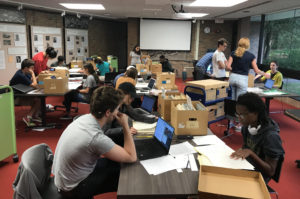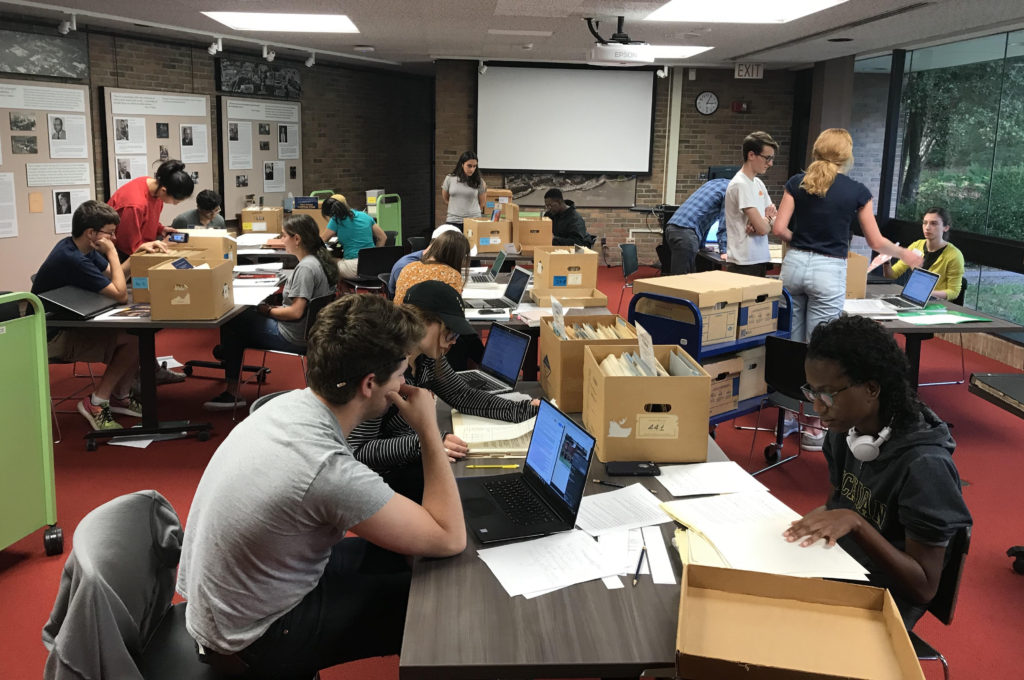Source: Michigan News

Student team researching the 1967 Detroit Uprising at the Bentley Historical Library as part of U-M Professor Matthew Lassiter’s course.

Student team researching the 1967 Detroit Uprising at the Bentley Historical Library as part of U-M Professor Matthew Lassiter’s course.
Interested in urban issues? Here’s a list of courses offered at the University of Michigan this fall.
College of Literature, Sciences and the Arts:
- ALA 250 – Topics in Critical Issues: Critical Issues in Detroit (Angela Dillard)
- This course gives you an opportunity to ask, “Why not me?” and create solutions to pressing social challenges. This 1-credit mini course is part of the Critical Issues Series presented by optiMize Social Innovation. The Critical Issues mini-courses feature expert speakers from campus and beyond, with each speaker introducing a pressing issue facing society and challenging students to design creative solutions.
- AMCULT 205 – American Cultures (William A Calvo-Quiros)
- This class analyzes and studies the history and evolution of cars and car cultures in the United States and its influence in Michigan. It uses the intersections of gender, class, race, and historicity as points of departure to understand the unique relationship that America has with cars, the car industry, and its developments. This class explores cars not just as transportation devices, but rather as a system of meanings and values, and as an everyday ubiquitous cultural product influenced by economic, political, and social forces.
- AMCULT 321/PSYCH 325 – Detroit Initiative: Community Research (Cathryn Fabian)
- This course is an experiential field course involving one visit per week to an African-American, Arab-American or Latino community in Detroit. Students are assigned to work with community-based organizations on projects to improve the well-being of children and families. Projects involve such activities as tutoring, developing outreach activities, assisting in child care settings, and working in community education projects.
- HISTORY 491 – Topics in History: Cold Cases: Police Violence, Crime, and Social Justice in Michigan (Matthew D. Lassiter)
- This research seminar is a HistoryLab course that will investigate unsolved or un-prosecuted cases of racial violence and police misconduct in the city of Detroit from the early 1970s through the early 1990s. Members of the seminar will work in teams, conduct archival and database research, interview historical participants, and collaborate in creating an online museum-style digital exhibit that combines historical narratives with interactive maps and reproductions of key documents, photographs, and audiovisual recordings. The class website will be the second project of the Policing and Social Justice HistoryLab, a multiyear initiative to research and document the history of policing and criminalization in Detroit and to map thousands of police-civilian encounters, including allegations of brutality and a comprehensive accounting of homicides by law enforcement. This lab/seminar will take students off campus, including multiple research trips to Detroit, and produce a website designed to contribute historical knowledge to current debates over policing and crime, racial and social justice, and mass incarceration in modern America.
- HISTORY 497 – History Colloquium: From Ghetto to Suburb (Deborah Dash Moore)
- What do Venice, New York, and Chicago have in common? All were described as possessing ghettos where Jews lived. And what do Berlin, Detroit, Los Angeles, and Miami have in common? All were considered new cities for Jews, places where Jews left the ghetto behind. This course looks at these European and American cities to examine how the ghetto got its name and its reputation as a quintessentially Jewish urban space and then how the ghetto lost its Jewish associations as Jews moved to new cities and new neighborhoods. Given these changes, how should we understand Nazi ghettos and African American ghettos? Some of these cities and neighborhoods possessed low density suburban attributes; others retained high density but nonetheless seemed a different, distant world from the old, foreign, oppressive ghetto. This transregional excursion into Jewish urban experiences will illuminate how they shaped contemporary understandings of what makes a city.
- HONORS 241 – Honors Core Writing in Humanities: Detroit and Gentrification Now (Kristin Ann Hass)
- This course will take up the current tensions around gentrification and redevelopment in the city of Detroit. It will be divided into three sections. The first will take a deep dive into the history of the city and scholarship on race and racialization in the city. The second will be a review of contemporary scholarly and popular thinking about gentrification in the 21st century. The third section of the course will be focused on a couple of case studies in gentrification and redevelopment in the city now. This part of the course will include guest speakers involved in the projects and multiple field trips. Students will be required to write a series of papers in response to each of the first two sections of the course and will be given the option to respond to the final section with either a paper or creative and/or publicly engaged project.
- LATINOAM 301 – Topics in Latino/a Studies: Ind. Theater (Jacob Rankin Hooker)
- This course provides undergraduates the opportunity to explore a specific topic in ethnic life in depth using an interdisciplinary approach.
- RCCORE 334 – Environmental Justice Organizing in Detroit: Special Topics (Diana Gayle Copeland)
- This course will explore the role the arts have played in resisting systemic inequalities, fighting injustice, and giving voice to those on the margins. We will consider both the strengths and limitations of art, particularly creative writing, as a force for social change as well as art’s effectiveness in engaging communities. Further, we will use the study and practice of creative writing to deepen our understandings of and relationships to the city of Detroit.
Taubman College of Architecture and Urban Planning:
- URP 592 – Real Estate Essentials (Peter Allen)
- The course gives students the tools to help develop cities with vitality, including lively, transit-oriented downtowns and livable neighborhoods through real estate development and investment. This is an interdisciplinary course oriented towards students in business administration, urban and regional planning, urban design, public policy, law, landscape architecture, natural resources and environment, and others. Students work in teams to understand the art and science of creating walkable, transit oriented downtowns and livable neighborhoods. Key course elements include eleven lectures, an interdisciplinary team project, discussions, visiting experts, frequent reference to Ann Arbor for emerging trends in urban revitalization, use of current web resources, and a text on how to invest wisely in downtown real estate. The course uses surrounding villages, Detroit and national case studies as teaching tools.
Ross School of Business:
- FIN 517 – Real Estate Essentials (Peter Allen) – duplicate course – URP 592
Law School:
- LAW 960: Detroit Litigation Advocate Workshop
- Detroit Litigation Advocacy Workshop Students in the Detroit Litigation Advocacy Workshop (“DLAW”) will participate in the City of Detroit’s affirmative public interest litigation program. This will involve evaluating various litigation options and assisting with any such cases that are actually brought. In any given semester, responsibilities might include: researching potential causes of action under federal and state law; identifying plausible defendants and researching the factual predicates for claims against them; drafting motions and legal filings; or otherwise assisting with litigation. Attention will be paid to both the strategic element of public interest litigation and the technical skills required to successfully execute on such strategies.
- LAW 961: Detroit Litigation Advocate Seminar
Ford School of Public Policy:
- PUBPOL 466: History and Future of Detroit (Walter Reynolds Farley)
- Detroit was the nation’s most important city in the Twentieth Century because of the auto industry, the emergence of the blue collar middle class and development of the New Deal. Now it is the most negatively stereotyped city in the nation. The course describes changes in Detroit and emphasizes policy developments in Rust Belt metropolises as they cope with the restructuring of employment.
School for Environment and Sustainability:
- EAS 537: Urban Sustainability (Joshua Newell)
- As engines of capital accumulation, cities have often been viewed as environmental sacrifice zones. Some critics have argued that ‘sustainable cities’ is an oxymoron.This course introduces students to the emerging field of urban sustainability from multiple disciplinary perspectives, primarily industrial ecology, urban political ecology, and urban planning. The course provides students with the theoretical and methodological tools in which to explore the potential for a sustainable urbanism. Approaches to foster more sustainable and resilient forms of urbanization and urban life, from localizations to dematerialization, are introduced and evaluated. Course deliverables include a mid-term exam, a group case-project, and three writing responses. A field trip to Detroit and meetings with stakeholders also form course components.


